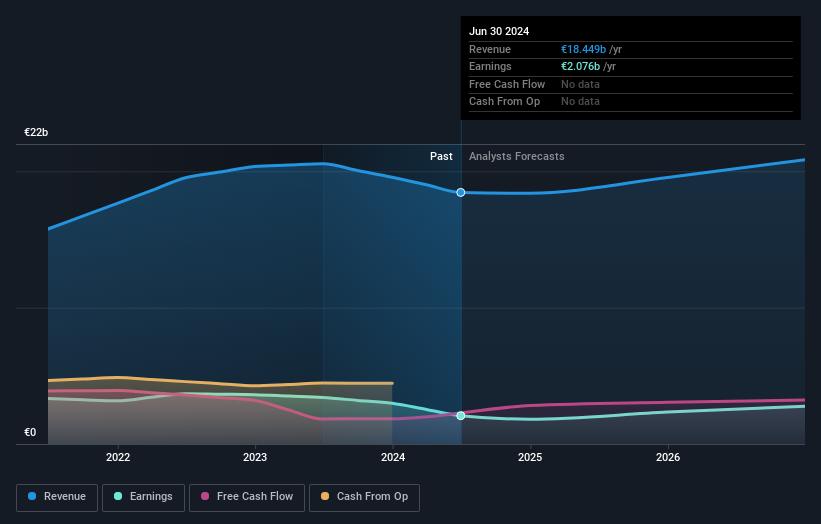Kering SA (EPA:KER) Just Reported Earnings, And Analysts Cut Their Target Price

Kering SA (EPA:KER) shareholders are probably feeling a little disappointed, since its shares fell 9.8% to €284 in the week after its latest half-yearly results. Kering reported in line with analyst predictions, delivering revenues of €9.0b and statutory earnings per share of €24.37, suggesting the business is executing well and in line with its plan. This is an important time for investors, as they can track a company's performance in its report, look at what experts are forecasting for next year, and see if there has been any change to expectations for the business. Readers will be glad to know we've aggregated the latest statutory forecasts to see whether the analysts have changed their mind on Kering after the latest results.
Check out our latest analysis for Kering

Taking into account the latest results, Kering's 23 analysts currently expect revenues in 2024 to be €18.4b, approximately in line with the last 12 months. Statutory earnings per share are forecast to drop 12% to €14.83 in the same period. In the lead-up to this report, the analysts had been modelling revenues of €18.7b and earnings per share (EPS) of €16.72 in 2024. The analysts seem to have become more bearish following the latest results. While there were no changes to revenue forecasts, there was a substantial drop in EPS estimates.
The average price target fell 6.1% to €345, with reduced earnings forecasts clearly tied to a lower valuation estimate. That's not the only conclusion we can draw from this data however, as some investors also like to consider the spread in estimates when evaluating analyst price targets. Currently, the most bullish analyst values Kering at €575 per share, while the most bearish prices it at €270. Note the wide gap in analyst price targets? This implies to us that there is a fairly broad range of possible scenarios for the underlying business.
Of course, another way to look at these forecasts is to place them into context against the industry itself. We would highlight that revenue is expected to reverse, with a forecast 0.7% annualised decline to the end of 2024. That is a notable change from historical growth of 8.0% over the last five years. By contrast, our data suggests that other companies (with analyst coverage) in the same industry are forecast to see their revenue grow 7.7% annually for the foreseeable future. It's pretty clear that Kering's revenues are expected to perform substantially worse than the wider industry.
The Bottom Line
The most important thing to take away is that the analysts downgraded their earnings per share estimates, showing that there has been a clear decline in sentiment following these results. On the plus side, there were no major changes to revenue estimates; although forecasts imply they will perform worse than the wider industry. The consensus price target fell measurably, with the analysts seemingly not reassured by the latest results, leading to a lower estimate of Kering's future valuation.
With that said, the long-term trajectory of the company's earnings is a lot more important than next year. We have forecasts for Kering going out to 2026, and you can see them free on our platform here.
Plus, you should also learn about the 2 warning signs we've spotted with Kering .
Valuation is complex, but we're here to simplify it.
Discover if Kering might be undervalued or overvalued with our detailed analysis, featuring fair value estimates, potential risks, dividends, insider trades, and its financial condition.
Access Free AnalysisHave feedback on this article? Concerned about the content? Get in touch with us directly. Alternatively, email editorial-team (at) simplywallst.com.
This article by Simply Wall St is general in nature. We provide commentary based on historical data and analyst forecasts only using an unbiased methodology and our articles are not intended to be financial advice. It does not constitute a recommendation to buy or sell any stock, and does not take account of your objectives, or your financial situation. We aim to bring you long-term focused analysis driven by fundamental data. Note that our analysis may not factor in the latest price-sensitive company announcements or qualitative material. Simply Wall St has no position in any stocks mentioned.
Have feedback on this article? Concerned about the content? Get in touch with us directly. Alternatively, email editorial-team@simplywallst.com
About ENXTPA:KER
Kering
Manages the development of a collection of renowned houses in fashion, leather goods, and jewelry in the Asia Pacific, Western Europe, North America, Japan, and internationally.
Average dividend payer with mediocre balance sheet.
Market Insights
Community Narratives


